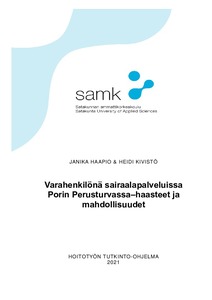Varahenkilönä sairaalapalveluissa Porin Perusturvassa –haasteet ja mahdollisuudet
Haapio, Janika; Kivistö, Heidi (2021)
Haapio, Janika
Kivistö, Heidi
2021
All rights reserved. This publication is copyrighted. You may download, display and print it for Your own personal use. Commercial use is prohibited.
Julkaisun pysyvä osoite on
https://urn.fi/URN:NBN:fi:amk-2021052410881
https://urn.fi/URN:NBN:fi:amk-2021052410881
Tiivistelmä
Tässä opinnäytetyössä tutkittiin Porin Perusturvan varahenkilöstöä. Työn tarkoituksena oli selvittää Porin Perusturvan sairaalapalveluissa toimivan varahenkilöstön työnkuvaa ja heidän näkemystään varahenkilönä toimimisen haasteista ja mahdollisuuksista. Opinnäytetyön tavoitteena oli tuottaa tietoa Porin Perusturvan sairaalapalveluissa toimivan varahenkilöstön työnkuvasta ja varahenkilönä toimimisen haasteista ja mahdollisuuksista heidän itsensä näkökulmasta. Henkilökohtaisena tavoitteena opinnäytetyön tekijöillä oli oppia tässä tutkimuksessa käytettävistä menetelmistä ja ylipäänsä tutkimuksen toteuttamisesta.
Tutkimusmenetelmänä käytettiin kvalitatiivista tutkimusta. Tutkimus toteutettiin teemahaastatteluna. Haastattelulomakkeenrunko sisälsi 16 kysymystä. Kysymykset oli jaoteltu kolmeen teemaan ja taustatietoihin. Teemat olivat työnkuva, varahenkilönä toimimisen mahdollisuudet ja varahenkilönä toimimisen haasteet. Tutkimuksessa haastateltiin kahdeksaa varahenkilöä. Tutkimus analysoitiin aineistolähtöisellä sisällönanalysointimenetelmällä.
Varahenkilönä toimimisen mahdollisuuksiksi koettiin työn vaihtelevuus ja monipuolisuus. Sen myös koettiin kehittävän ammattitaitoa ja antavan mahdollisuuden välittää toimivia työtapoja osastolta toiselle. Kuormitustekijöiksi nimettiin kiertäminen, kiire ja aggressiiviset potilaat. Toiveita, joissa haluaisi itse kehittyä, olivat tietokoneen käyttäminen, elvytyksen kertaus, mobiilitoiminta, diabeteksen ja haavanhoito sekä laboratoriovastausten tulkinta. Esiin nousseita kehittämiskohteita olivat varausjärjestelmä ja erityisesti siinä se, että tieto varauksesta tulisi varahenkilölle asti. Muita kehittämiskohteita olivat varahenkilöstölle tiedottaminen, perehdytys sekä parempi kommunikaatio osastojen ja varahenkilöstön esimiesten kesken. Jatkotutkimuksia voisi tehdä siitä, kuinka paljon varahenkilöstöä käytetään ja onko määrä riittävä. Lisäksi voisi tutkia osastojen kokemusta varahenkilöiden osaamisesta osastolla työskentelystä. The purpose of this thesis was to study about resource team ́s work description and their experience about the good and the bad sides of work. The aim of this thesis was to gather information about the resource team’s work description and about the good and the bad sides of work. The personal aim was to learn more about the methods of this thesis and to learn how to do a study.
The study was qualitative. The data of the study was collected by using a semi-structured thematic interview. The interviews had 16 question. The questions were shared into categories which were background information, work description, potentials and good sides of being a float pool nurse and challenges and bad sides of being a float pool nurse. There were eight interviews in this study. The data was analyzed by using the qualitative content analysis.
The good sides of being a float pool nurse were versatility and variability of work. Float pool nurses felt that they could use and develop their skills and that they could transfer different working habits from one ward to another. The bad sides of being a float pool nurse were changing place every day, rush and aggressive patients. The interviewees hoped to get training about using computer, resuscitation, mobiili, diabetes and wound care and laboratory responses. Their suggestions for developing resource team were developing the booking system, specially that the booked nurse would know about the booking. Other suggestions for developing were about informing resource team better, work orientation and that the supervisors of wards and resource team would communicate more. Further studies could be about how much do they use resource team and does it have enough workers now and also about the wards experience of resource team ́s knowledge about working in the ward.
Tutkimusmenetelmänä käytettiin kvalitatiivista tutkimusta. Tutkimus toteutettiin teemahaastatteluna. Haastattelulomakkeenrunko sisälsi 16 kysymystä. Kysymykset oli jaoteltu kolmeen teemaan ja taustatietoihin. Teemat olivat työnkuva, varahenkilönä toimimisen mahdollisuudet ja varahenkilönä toimimisen haasteet. Tutkimuksessa haastateltiin kahdeksaa varahenkilöä. Tutkimus analysoitiin aineistolähtöisellä sisällönanalysointimenetelmällä.
Varahenkilönä toimimisen mahdollisuuksiksi koettiin työn vaihtelevuus ja monipuolisuus. Sen myös koettiin kehittävän ammattitaitoa ja antavan mahdollisuuden välittää toimivia työtapoja osastolta toiselle. Kuormitustekijöiksi nimettiin kiertäminen, kiire ja aggressiiviset potilaat. Toiveita, joissa haluaisi itse kehittyä, olivat tietokoneen käyttäminen, elvytyksen kertaus, mobiilitoiminta, diabeteksen ja haavanhoito sekä laboratoriovastausten tulkinta. Esiin nousseita kehittämiskohteita olivat varausjärjestelmä ja erityisesti siinä se, että tieto varauksesta tulisi varahenkilölle asti. Muita kehittämiskohteita olivat varahenkilöstölle tiedottaminen, perehdytys sekä parempi kommunikaatio osastojen ja varahenkilöstön esimiesten kesken. Jatkotutkimuksia voisi tehdä siitä, kuinka paljon varahenkilöstöä käytetään ja onko määrä riittävä. Lisäksi voisi tutkia osastojen kokemusta varahenkilöiden osaamisesta osastolla työskentelystä.
The study was qualitative. The data of the study was collected by using a semi-structured thematic interview. The interviews had 16 question. The questions were shared into categories which were background information, work description, potentials and good sides of being a float pool nurse and challenges and bad sides of being a float pool nurse. There were eight interviews in this study. The data was analyzed by using the qualitative content analysis.
The good sides of being a float pool nurse were versatility and variability of work. Float pool nurses felt that they could use and develop their skills and that they could transfer different working habits from one ward to another. The bad sides of being a float pool nurse were changing place every day, rush and aggressive patients. The interviewees hoped to get training about using computer, resuscitation, mobiili, diabetes and wound care and laboratory responses. Their suggestions for developing resource team were developing the booking system, specially that the booked nurse would know about the booking. Other suggestions for developing were about informing resource team better, work orientation and that the supervisors of wards and resource team would communicate more. Further studies could be about how much do they use resource team and does it have enough workers now and also about the wards experience of resource team ́s knowledge about working in the ward.
